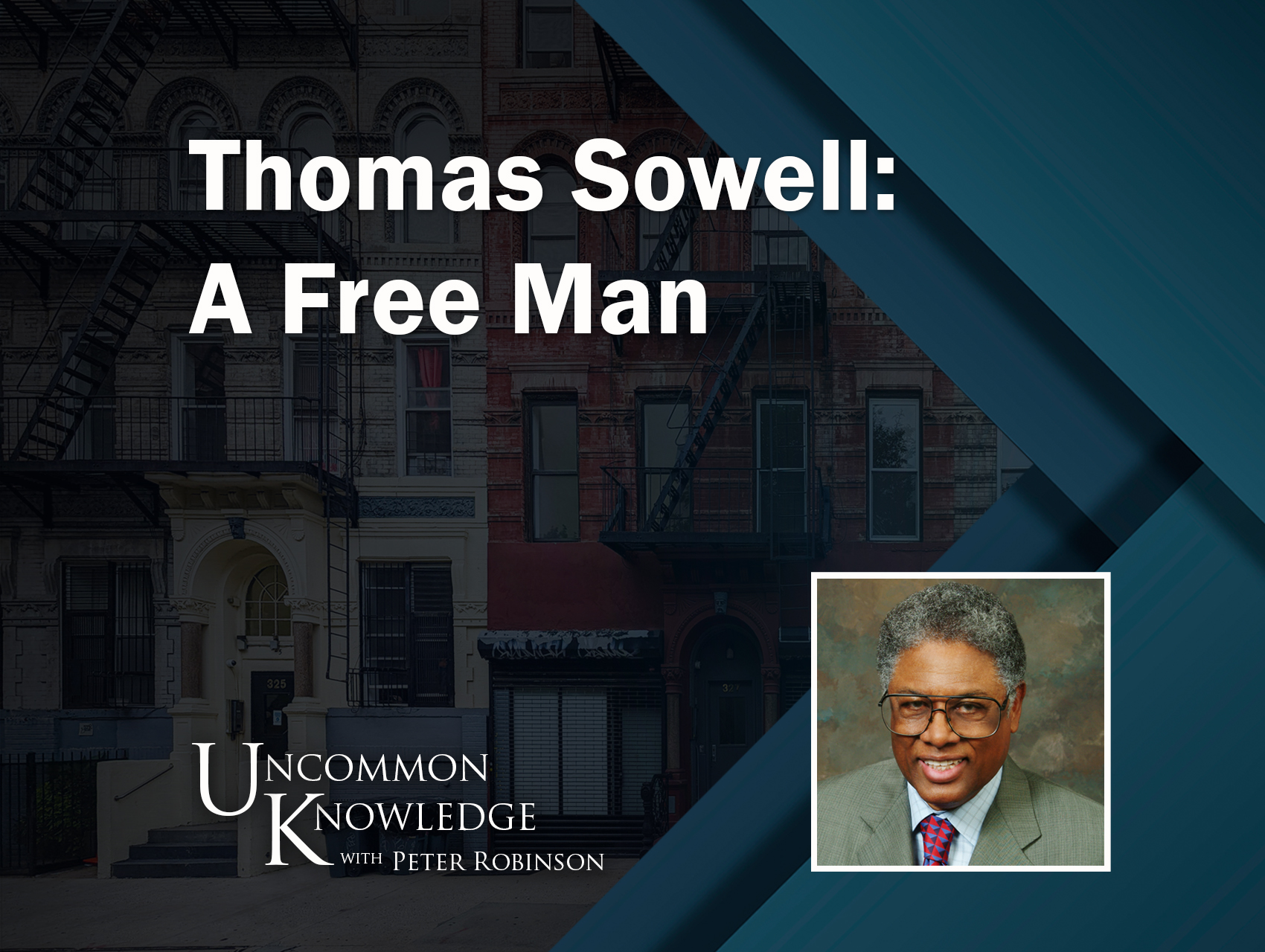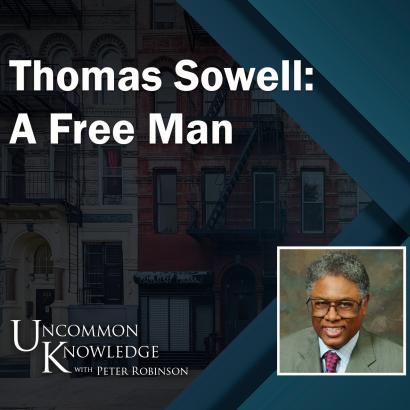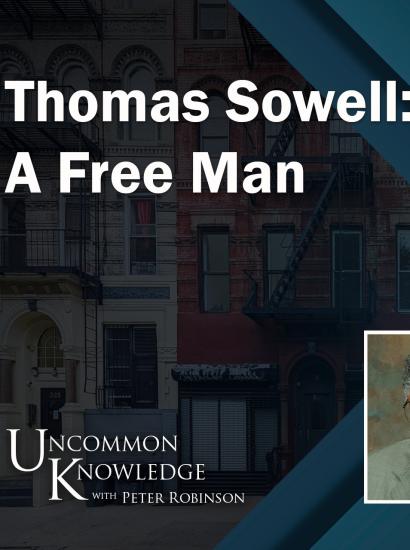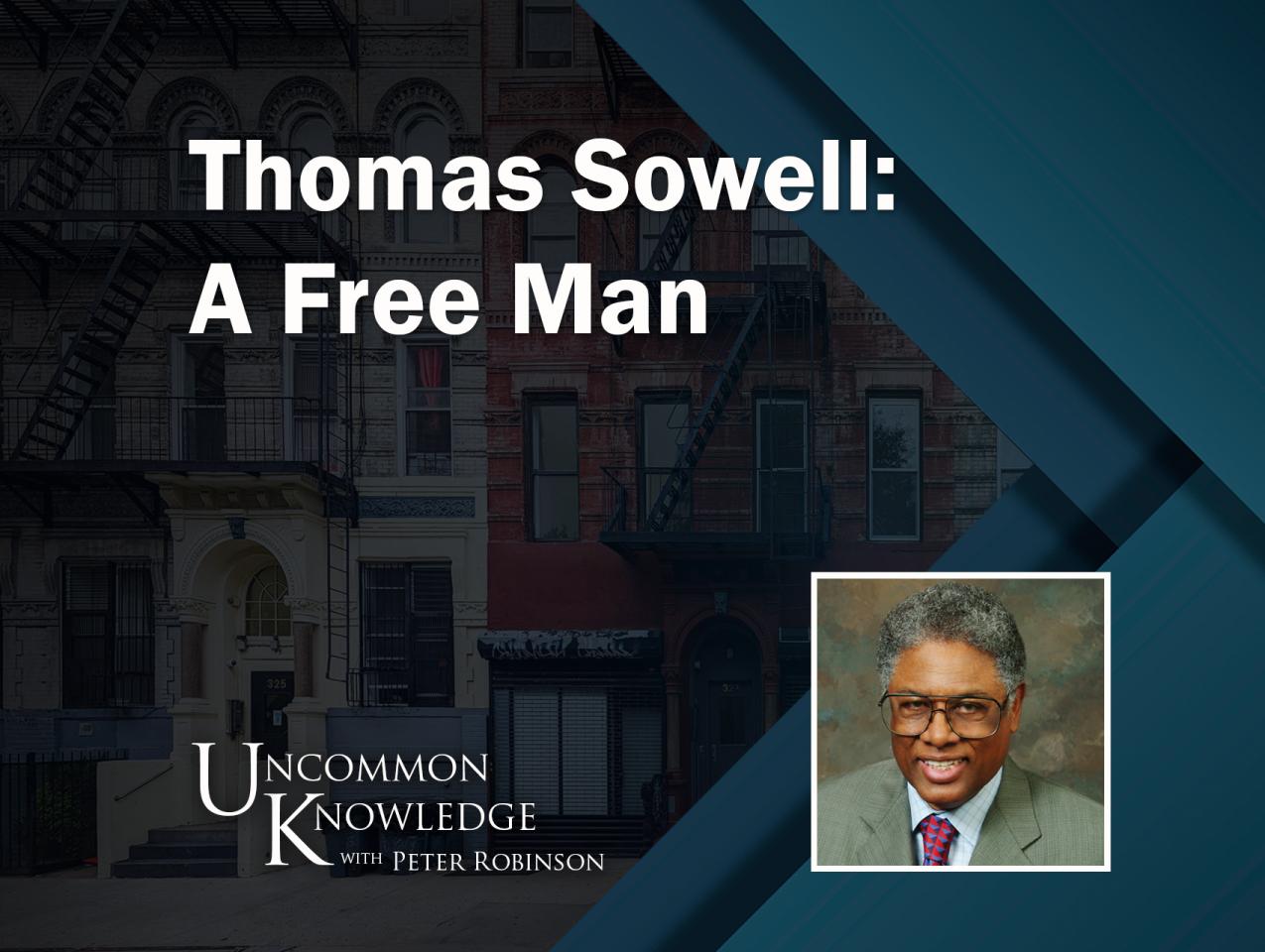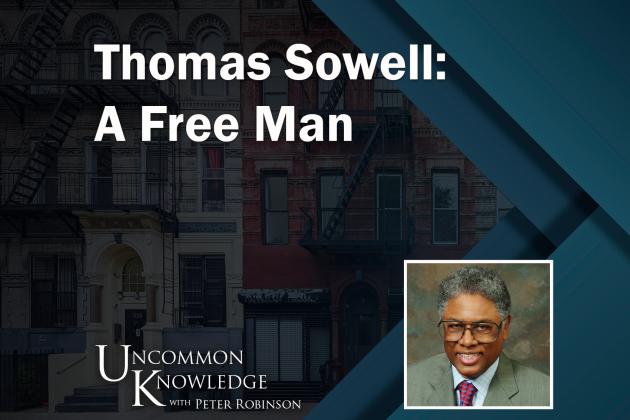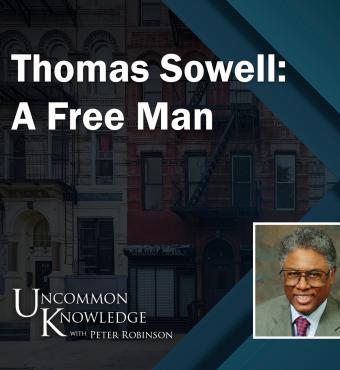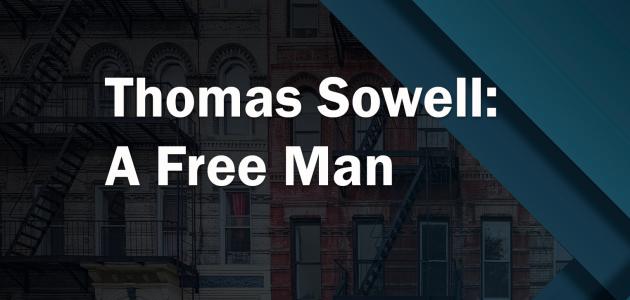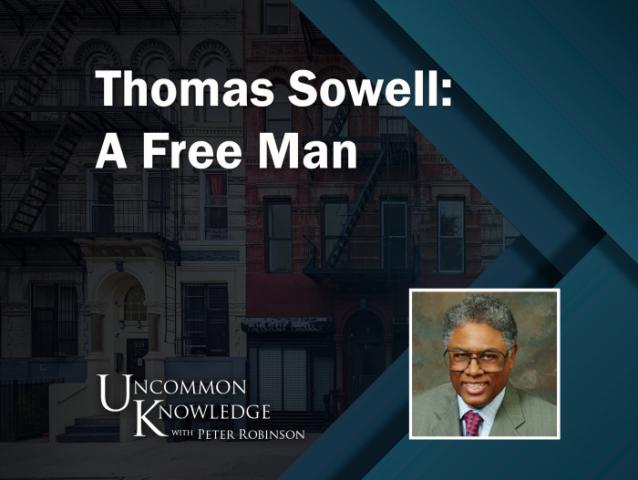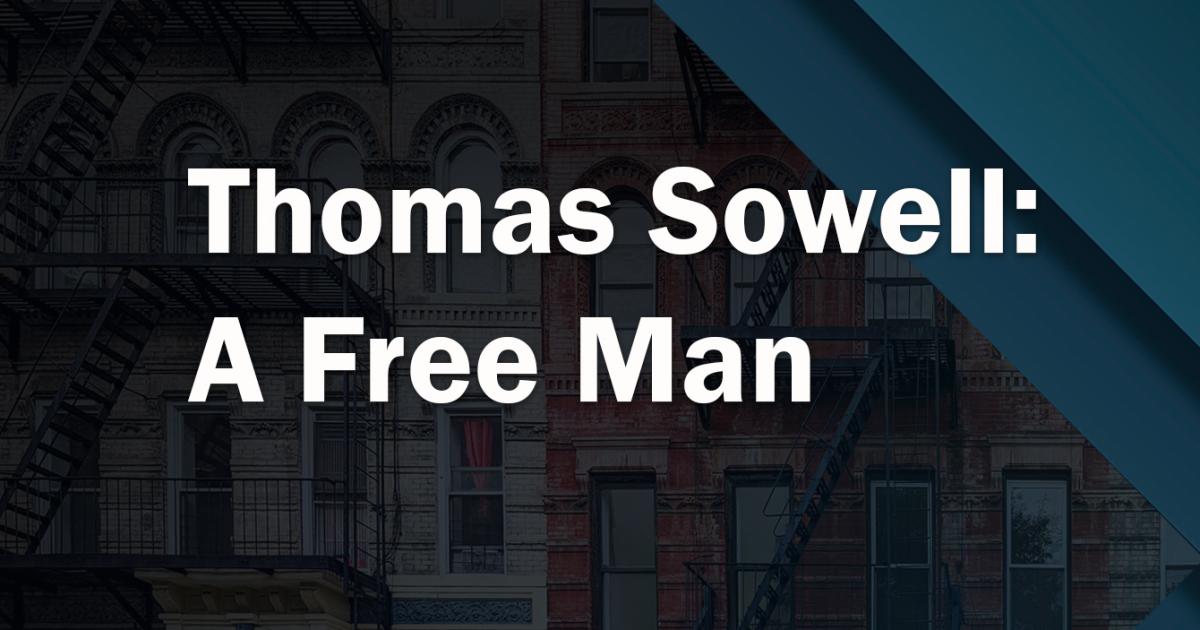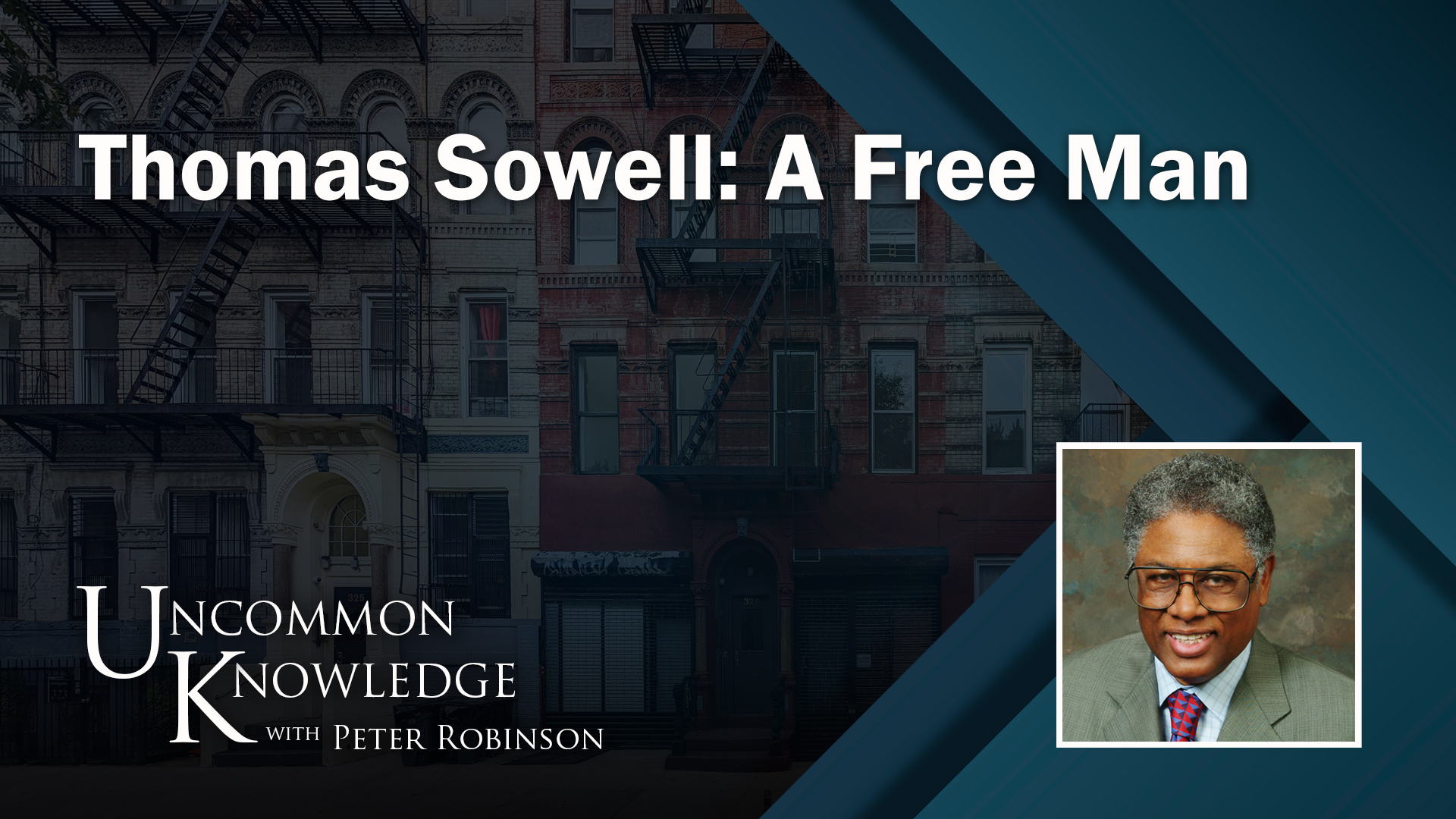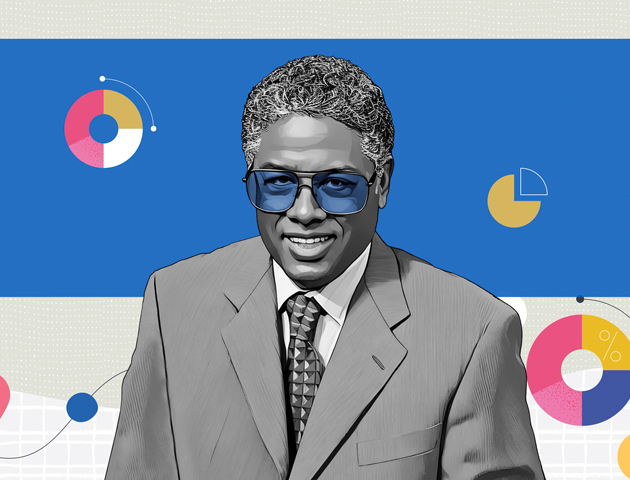- Politics, Institutions, and Public Opinion
- Comparative Politics
- Economic
- Economics
- History
- Answering Challenges to Advanced Economies
- Revitalizing History
This special episode of Uncommon Knowledge with Peter Robinson features our most requested guest: Hoover senior fellow and acclaimed economist and author Dr. Thomas Sowell. But rather than discussing Sowell’s many books, this conversation explores the full arc of Sowell’s life — from his childhood, along a dirt road in North Carolina, through his years in Harlem, the Marine Corps, Harvard, and ultimately to his long tenure at the Hoover Institution.
Through rich storytelling and candid reflection, Sowell recounts his early struggles and triumphs: growing up in poverty yet surrounded by love, discovering books and ideas in a Harlem library, working his way through school and menial jobs, and eventually earning degrees from Harvard, Columbia, and the University of Chicago. Along the way, he shares how experience and evidence—not ideology—shaped his transformation from a young Marxist to one of America’s most influential champions of free markets and individual responsibility.
The interview reveals the wit, humility, and intellectual rigor behind the man who has spent decades challenging conventional wisdom. From tales of family and resilience to his enduring skepticism of government programs, Sowell’s reflections illuminate a life defined by hard work, empirical reasoning, and independence of mind.
This is Thomas Sowell’s American story—told in his own words.
Recorded on December 19, 2024.
- I'm Peter Robinson of Uncommon Knowledge. Today, an interview with, by far our most requested guest, Thomas Sowell. We filmed this interview last December, that is December of 2024, and it's a special interview. I've interviewed Tom over and over again over the last quarter of a century, but always before we've been discussing one of his books. How did he come to write the book? What are the arguments in the book? What are the critics said about the book? How does he answer the critics? But always that book. In this interview, we're gonna be hearing about Tom Sowell's life, beginning with the small home on a dirt road in North Carolina where he spent his first years. Then we moved to Harlem, we moved to the Marine Corps, and on it goes, we're used to thinking of Tom Sowell as being Tom Sowell, the author, the Brilliant Intellect in this interview, how Tom Sowell became Tom's Soul. Welcome to Uncommon Knowledge. I'm Peter Robinson. Thomas Sowell has studied and taught economics, intellectual history, and social policy at institutions that include Cornell, UCLA and Amherst. Now a senior fellow at the Hoover Institution. Dr. Sol has published more than three dozen books by my count, no fewer than 45. And then if you add the anthologies and the revised editions, it gets up to 70 books. Tom, Tom Sowell, welcome back. Good being here on every other program we've recorded over the years. We've been talking about a specific book of yours. I'd like to talk about your early life, although there is, there is a specific book, a personal odyssey. Yes. But I, I have questions from other books as well. Let's go back to the beginning. Before there were books before Tom Sowell had become the Thomas Sowell, and I'll, I'll be quoting often here from a personal odyssey. Before you were born, your father who was dying, Asked his aunt to raise you because your mother already had four children to raise on the wages of a maid. You didn't know until much later that you were adopted and visits from your mother to see you. And I'm quoting again, a personal odyssey were managed so well that I grew up to adulthood with no memory of the woman who came very unobtrusively in my early years, supposedly to visit with the adults. Close quote, your father died before you were born. You didn't know your mother was your mother. And in fact, you have no memory of her and yet you right of your childhood. These were some of the happiest times of my life. Close quote, how
- Well I I I, I think I was much more of a, of a celebrity and at, at that point to my family than I of a business that I remember when I was mu much older, had a son of my own. And like many new parents, we wanna know when is the child supposed to do this and do that. You know,
- When did they first walk? When did they cut their teeth all over?
- Yes, yes, yes, yes. And so the last surviving member of the family in which I grew, grew up. I asked her, how old was I when I first began to walk? She said, oh, Tommy, nobody knows when you could walk. Somebody was always carrying you. Ah. And then later years, when I did research on child development, among other things, I, I, I was struck by how, what an emphasis people put on those first three years of life for the child's development. And, and I thought back to that, I was really quite lucky because those were really probably the three happiest years of my
- Life. You were adored.
- Yeah. Yeah. Yes. And, and the people who are constantly trying to get children out of the, out of the hands of their parents so that the so-called experts can, can deal with 'em. They don't, they don't seem to understand that the, the parents who may not have PhDs may not have a lot of other things, but the fact is they can do more for you than anyone. And the parent, the family in which I grew up was not Ed educated. I remember when we moved to New York and the, the schools in New York were so much more advanced than school, school schools in the south. They were, they, the tradition was to put back a southern kid a year when, when the school. But I, I talked the principal into letting me stay in that. And I, it was one of those IC victories because I really was not ready for it. And when I came home, I could ask, ask the adults to help me with the homework. And I was told, we don't have enough education ourselves to help you.
- Oh, really?
- And it was brought home to me again, by the time I got myself together, I was promoted to the seventh grade and, and there was such a to do in the family. And I said, what, what, why is this time rather than before? And they said, you've now gone further than any of us
- To seventh grade.
- Yes.
- A a again, Tom, a personal odyssey. The first house I was a wooden house at 1121 East Hill Street in Charlotte, North Carolina. It was on an unpaved street, like most of the streets, in the black neighborhoods. There was a living room, a kitchen, and two bedrooms. That's four rooms for as I count the family was five, including you in the kitchen. There was a wood-burning stove. The toilet was a little shed on the back porch for heat. In the winter, we had the stove, a fireplace in the living room, and a kerosene heater for light at night. We had kerosene lamps. It never occurred to me that we were living in poverty. Yeah. Close quote. So what does that tell us? Or am I overreading it? Does that tell us that poverty is in some, there's some element of poverty that is subjective?
- Yes. Yes. And that was the anyone who reads the history of groups like the Eastern European Jews or the, or the Irish before them immigrated to the United States. The conditions under which they lived were worse than it was in which I, under which I lived. But they, they didn't spend their time worrying about that. Milton Friedman at someplace mentioned that, you know, his mother worked, worked in and, and what, what would call sweat shops, long hours, low pay, and so forth. He never heard her complain about it. She was, was glad to have the job, and he gave her a chance to try to try to learn English at the same time. But now you, you, you make such a to deal to do about it that everyone feels that they're, they're entitled to this and that and so forth.
- 1939, you're now nine years old and your family leaves North Carolina For New York, a personal odyssey, we lived on the top floor of our building at seven 20 St. Nicholas Avenue. We had a gas stove, hot running water, and a built-in bathtub all for the first time. The adults in the family had never had the opportunities that I little Tommy that I would now have in New York, including the opportunity for a good education. And they wanted me to make the most of op those opportunities. It was a theme I would hear again and again over the years. Yeah. Close quote, you mentioned this yourself a moment ago, but when I read that account, I thought to myself, this sounds so much like an immigrant account.
- Yes.
- That moving from the, from the south, it was simply the south to you. To me, it's the old South. Yes. It's a different era. It's that, that during that century, when the south was almost its own country, moving from the south to New York was almost like moving from Poland, Sicily to New York. Oh, no question about it. No
- Question about
- It. Describe your first trip to the public library.
- Oh, heavens. There was the, before I moved up to New York, other family members had gone ahead, often happens in these kind of situations, which immigrants as well as a blacks moving out of the south. And somehow in middle of Harlem, they ran, ran into a kid who was very intelligent, very well-read and so forth. And, you know, and sort of the, the light bulb went off in their head that this is somebody that, that, that can be helpful to Tommy because his kid knew things that they didn't know and so on. He knew his way around the neighborhood and Yes. Yes. And Eddie Map was his name. And so they had, they persuaded him to come in from that. So sort of take me under his wing and he, he decided to take me to a public library. And I was puzzled as to why I was in this building with all these books. I'd never seen so many books, you know, and, and I didn't have enough money to buy one book, so I don't, you know, what am I doing here? I was already thinking like a Chicago economist. And, and it took, took a lot of persuasion on his part to get me to venture, to take out a library card. And so I did, took heck out a library card and, and even borrowed two books. And I arrived in New York in May, and of course I wouldn't be in a school until September. So there were, there were no kids to play with and so forth. So it was a pretty dreary existence. And so I, I had these books and, and that's when I first got the habit of reading books
- At the age of nine.
- Yes. Yes. And that, that's quite late. And eventually I would've course have learned about public libraries, but eventually might be too late.
- Mm. Tom, you write, when you were in the south, there were, you said at one point that white people were almost hypothetical to you. You had very little to do with white people. Yes. And yet there's an account, there's a white man who visits the neighborhood. I think he was a repairman of some kind.
- No, no. He was a, he was a foreman. He was. And he, he had his produce that he was selling.
- He was selling produce in the neighborhood. And you played for a little while with his little girl.
- Yes.
- And then your, your adoptive mother said to you afterwards, you've just taken your first step toward the gallows.
- Yes. - So you get this sense of menace in the south.
- Oh yes.
- Toward black people.
- Yeah.
- What about Harlem? Did Harlem feel safe?
- Well, everything is relative, but, but we didn't have the, the racial problems. We had other problems because a lot of kids who did more fighting at the school in, in Harlem and, and, and because I still had a southern accent there, they would pick on me, you see? And, and I would try to reason with him. And one day when I could run outta reason, I simply grabbed one kid's head and smashed his face into a stonewall. And I discovered that people stopped bothering me. And it's a lesson I have kept in my mind up to this present day.
- I have to admit, Tom, you were a tough kid. And I, I, I hadn't realized quite what a scrapper you were. But I did think to myself when I was reading this book, Tom and I have had little disagreements, but thank, thank goodness they stayed little. I'm not sure how, how well I would've come out of a major disagreement. You write at some length about the schools you attended in New York. Some schools were better than others. Yeah. And some teachers were better, better than others. But you got a good education.
- Yes. - How much of that credit, in fact, this is a kind of a question that runs all the way through a personal odyssey. The old nurture versus nature. Yes. But how much of that credit for the education you got goes to the schools and how much was just Tom soul was unusually bright. That also comes through that on all the IQ tests. You're score, you're all constantly being placed in the, with the smarter kids. You start reading at the age of nine, how much was just plain you and how much was the schools?
- Well, that, that's a tough one For a long time. I, I I, I'm, I don't have a dog in this fight about nature versus the
- Nurture. Nature versus nurture. Right.
- Because eventually I did learn that, that I had, had, had, had, had a family I was born into. And I, I didn't meet my brothers until I was 20 years old. And it was clear that there were, there were, I, I was more like them than I was like anybody in the family that raised me.
- Oh, really? Alright. Oh yes. So the nurture was obvious.
- Yes. I I remember one particular, we, we, we'd, we'd been attracted to the same kinds of poetry and so forth. And one time I was in a car where my, my brother was driving and we had, we had a big traffic jam just sitting, just sat there for a long time. And he said as idol as a painted ship. And I said, upon a painted ocean, you know, you
- Know, you could finish the poetry for him.
- Yes.
- You've been reading the same things and remembering the
- Same things. Another time he had, he, he still said it was many and many a year ago when I said In the Kingdom by the sea. And, and one of the decisive things to me was much later, later when I was grown and had my son and I was staying someplace, we waiting for my older bro, oldest brother to come over and talk. And when he came, guy came in out south, take her outside with my son is so you can in I, I'll introduce you to him. And he said, I've already met him. We've had a conversation. And I said, how, how, how did, how, how did you pick him out with all those kids out there? He says, Tommy, when I see a dozen kids out there all doing the same thing, and in the midst there's one kid doing something entirely different. I know who our mother's grandson is.
- Got it. Got it. Back to New York, you went on to high school And a couple of major events take place. The high school that you got into was Scent High School Stuyvesant. Yes. Which was one of the most prestigious schools in the public school system in New York. You had to take exams to get into that. Yeah. So it was a big deal to get into divest. And then you discovered it was just too much to get from where you were living in Harlem, all the way down to Stuyvesant High. You write in the book about the commute, you have to take the subway and change a couple takes an hour in each direction. You got ill your first year and missed a number of weeks and you dropped out of high school and things got difficult at home. Yes. And you left home.
- Yes. - So you're now 16 years old living in a room at something called the Home for Homeless Boys. Yes. While holding a full-time job as a Western Union message.
- Well, you have, you have a sequence a little Alright. Out, out at the i I I went to the home for homeless boys for I, I stayed there three days 'cause I had a job.
- I see,
- I see. And so, and I, I, I was no longer working for Western Union now I was working for people at the garment district. And so I then moved into this a little place that had, it had a room for room for rent. And the, the room, the room was less than a third, the size of my bathroom at home today. And there was no closet. There was just a, a hook? No, there was a, there was a nail in, in the wall where I, and that was sufficient for my wardrobe at the time. So, so that, that was the way that came about.
- So you knocked around and you considered becoming an illustrator. The training was too expensive. You try it out for the Dodgers.
- Oh my, my everyone has a scam handle in their lives.
- You, but you missed a couple of grounders at first base, so they never even let you hit, which is what would've been your strength. And it was rough. A personal odyssey, 1949 would turn out to be one of the worst years of my life. Yes. It was a recession year and I was plagued with recurrent unemployment. I walked the streets looking for work seemingly forever. Each day I would decide which was the most promising job to go for and would, would arrive early enough to be the first in line. When that interview was over, it was off to the next job on the list and so on. All day long until I finally returned home tired and dispirited, I finally got a part-time job working at night in a machine shop on the lower East side. I knew where to buy day old bread for 5 cents a loaf and a jar of jelly for 10 cents. That and water constituted my meals. This may sound impertinent, but was that to be endured or did you learn from that experience from those years? This goes on
- For years. Both, I think both. Both, yes. Yes. Years. A few years later, when I was in the Marine Corps, I remember some, someone was coming around selling something in the, in the barracks and everybody was for, for a quarter and everybody was by snapping it up. And I was pondering at Jan know and eventually said out, I, I, I think I'll take one. Or some said, oh, diamond Jim Soul is gonna spend the quarter, you know, cost. Because I, I had become very conscious of while watching my expenditures from, from that kind of experience in 1949,
- You were eating on 15 cents a day.
- Well, loaf
- Of bread and Yeah, yeah, yeah, yeah. A personal odyssey. Again, now these are during rough times, but what comes through here again and again is books. The desire to learn. Yeah. One day I found an old secondhand set of encyclopedias. Now it's striking that you remember the price for $1 and 17 cents. And I bought it. One of the entries was about Karl Marx to whose ideas I was attracted for the next decade. These ideas seem to explain so much in a way to which my grim experience made me receptive. Alright. I read that and say to myself, this is one of the few times in your life when you're so low that you're open to thinking of yourself as unfortunate. Perhaps not a victim. Exactly. But here it is in the late forties, early fifties America, and you turn to somebody who can explain things on class rather than race.
- Yeah.
- Why, why is that?
- It,
- It just made more sense to you.
- Yes. But the other thing too is the education system then and now offers very little in the way of explanations. And so this is, this is the first vision of the world. That, that there was, in other words, there, there was nothing about the Federalist papers or things like that, that would explain why this is done this way and so on. And when there, when there's not much competition, you go with what, what what looks, looks the most promising.
- I see. But okay, I, you, you read Marx thoroughly. You another place. You talk about that you knew Marx by the time you got to Harvard, which we'll come to in a moment. But you knew Marx backwards and forwards. That's the phrase you used because you've been reading it for so thoroughly for so many years. But you didn't become a member of the party.
- Oh, no, because I, I skepticism and also also I had been told that the Communist party was, the United States was not a regular party. They were simply in a, a branch of the Soviet Unions system. And, and, and the crucial thing was that World War II was going on in, in 1941, and the Soviet Union was initially on the side of the Nazis. And then on in June of 1941, Hitler invaded the Soviet Union. The, the communist, the daily work, which was the communist newspaper up to that time, has been saying the United States shouldn't get involved in this war. The, it's not our war and so forth. Suddenly they, the United States should get into the war. Wow. Literally from one day to the next. And again, I had this empiricism, I read that in a book by Arthur Schlesinger Jr. And so I went down to the main public library and I got out the old copies of the daily worker down there and read it for myself. And that's something unfortunately that very few students are taught to do today. You, you go along with what, which way the rhetoric happens to be running. And if it sounds good to you, that's what you go with. But no, I went there and checked it out for myself and that, and that immunized me from going that route.
- You were too much of an empiricist and a contrarian to become a communist.
- Yes. I guess
- I sort, you know, I think the Cold War might have ended 20 years earlier. If you had become a communist, you would've, you would've brought them down from the inside, Tom. Alright, so you get a pretty good job in a machine shop. Yes. But you have an accident, you maul a finger and you move down to Washington and get a job in the civil service. I'm quoting you again. The government job was all right. And the steady income, about $47 a week before taxes was good. The city of Washington, however, increasingly got on my nerves at a number of fad fast food places downtown whites could sit down and eat, but blacks could only eat standing up at the counter. I went hungry rather than subject myself to that. In November, 1950, I wrote a long letter to the Washington Star urging the desegregation of the city's public schools. It was the first thing I had written that I know was published close quote. So you are conscious right from the get go of racial injustice and it makes you angry. You'll go hungry rather than put up with that kind of humiliation. And yet, Tom, this is difficult to get today to people who haven't read the whole book, but the, in your own life, The notion of racial, even of race itself is a side issue. It appears from time to time. The main narrative is Tom's soul working, working at different jobs, trying to figure out how to get ahead reading books. And so we get this notion, you, you argue in some of these three dozen, many of these three dozen books that I've, I've said, as you've written, you argue that people should, it's a mistake to put your faith and particularly your energies in politics. You should be putting your faith in yourself and engaging in self-development. Yeah. And somehow that was part of, that was just part of your outlook. It's what you did. Or did you think things through, did you say to yourself, I don't have time to get involved to become some sort of racial activist? How conscious was your thinking about how to handle the race question while you were so busy struggling to get an education, hold down good jobs and so forth?
- Oh, I guess it was one of many things that, that I thought about. But, but again, I was, I was an empiricist and I know that many of the things that were said to be causing one thing, causing another, don't, don't stand up if really scrutinize them and, and, and logically analyze. Got it. Alright.
- Spring of 1951, you return from Washington to New York, go back to work in a machine shop. But with the Korean War taking place by that autumn, you find yourself inducted into the United States Marine Corps, where you served as an official photographer achieving an honorable discharge in 1952. Here's what you say in a personal odyssey about your promotion from private to corporal. No one who knew me in the Marine Corps ever questioned why I never made sergeant. But quite a few expressed amazement that I was not busted back to private.
- Yep. Yes. I was a I was not a conformist.
- You, so we haven't, well we touched on this jokingly a moment ago, but you really were a tough guy in the Marine Corps. You, you, you recount a lot of the fights you get into and you actually were boxing in the Marine Corps. So by the time you're in the Corps in this book, the reader sees Tom so is smart. He has a very well established sense of himself. He's contrarian, he's defiant, he's empirical, but he's also a really tough young man. Where did the toughness come from?
- I have a nose. I I guess that, that, that could be the old nature and nature thing because I, I, my, my oldest brother was, was, was like, like that.
- Oh, was that so
- Yeah, he was, he was, he was working for the post office and there was some criminal did something and he just went out there and overpowered him. Oh. The other thing about him, there were riots, race riots in, in Washington in the 1963 I, I believe and iPhone. I could phoned and I couldn't, I couldn't get him at home. And I wondered what was going on. I later discovered he was out there in the midst of the rioters and he was saying things like, after you burn down this man's store, where, where are you gonna shop Now? I I would not have thought the riot was a place for a Socratic dialogue,
- But actually you would have Tom if you'd been in a riot. That's exactly the kind of thing you'd have done. I would, I would, I would think, alright, student life, you're discharged from the Marine Corps, you get a job in the stock room of a camera store and you start attending school at night. A personal
- Odyssey. I didn't start, I I I had been gonna school at night prior to entering the Marine Corps.
- Oh, okay. So you continue going to school at night. One night as I was leaving the store, I mentioned to the elevator man that I was too tired to go to school that evening. He became distressed, almost alarmed. What did the elevator man say to you?
- He said, oh, and even though you, you, you feel like it. And he look back on his own life, he, he was British and he was saying that at one time, as a young man, he had an opportunity to go to Australia for some big opportunity there. And he, he passed it up, but he's always regretted it since, since then.
- And that made an impression?
- Yes. Yes.
- Alright, so you went to night school, New York, you go back to Washington, another civil service job in Howard University as a part-time student there, you studied with Sterling Brown. Ah, yes. A very distinguished poet and literary critic. You gave him a short story in a writing class on writing Oh yeah. On composition. He marked it up in detail. And you saw that fiction was not going to be your future, but I'm quoting you again. I did acquire an appreciation of the beauty and power of plain writing, which helped me the rest of my life. The beauty of plain writing. Yes. How, how, how, how did that strike you?
- Well, I had been writing fiction before that and, and, and studying under Sterling Brown. Let me see how, how, how, what the writing doesn't have to be pretentious. You just put the words down there and roll.
- So he, so under Sterling Brown you discovered, this is me speculating here, but you discovered, you discovered a mode of prose that fit you. Yes. Unpretentious. Straightforward, factual. Alright. Aside from Sterling Brown, you found the instruction at Howard Disappointing. And you applied for a transfer and soon found yourself at Harvard. Now this doesn't happen to every jo, every person who wants to apply who, who, who applies for a transfer from Howard. But you go to Harvard and your first midterm grades are two D's and two F's.
- Yes. - And as is clear in this book, right up until then, Tom Sowell succeeds in school every time he's in school. Yeah. Alright. Over the Christmas break, and again, I'm gonna quote you, I memorized German words by the hour, worked out math problems, taught myself to use a slide rule, and went through chemistry, the chemistry textbook, solving every problem in it from cover to cover. Things began to fall into place. And material that had once seemed impenetrable now turned out to be quite manageable. I graduated from Harvard Magna cu Laude. Okay. So another one of these sort, something along the theme of nurture versus nature, nur nature versus nurture. Did Harvard teach you hard? The, that academic work ethic, Lord knows you were hardworking. Yeah. Did Harvard teach you how to apply yourself, how to apply your work ethic to academic work? Or was it simply a matter of bringing in to play the work
- Ethic? What's simpler than that? One of my roommates said to me one day, Tom, when are you gonna stop goofing off and get some work done? I said, goofing off, you know, I
- You've been working as far as you could tell.
- Yes, yes. But when the grades came out, I thought, well, time to reassess things. And I was totally know I was gonna have to shape up or ship out. And I, I didn't have any place to ship out to. So I that I narrowed the options. There was also when I, I, because I had such a bad time, I had had another room right there. And I, and after I, in, in this, in the fall semester, I had four, four C's and thinks best Act four Bs. And I was looking through the catalog one day and I said, Mike, do you realize that if this, if this late date, I could still graduate Martin K out. And he burst out laughing and I
- Graduated. That's all, that's all you needed to the, the challenge, the code, a personal odyssey quote, Harvard made a major contribution to my development. But when time came to leave, I felt that it was not a moment too soon. Yeah. Why? I guess I
- Saw, oh, there was a certain smugness. You've heard that you, you may have heard the old saying, you can always tell a Harvard man, but you can't him much. And, and I, I, I remember a few times I'd run into those people and I would sometimes argue with him, get, get, get him out on a limb and I argue and then cut the limb off. And I remember one, my same roommate who had laughed at me was saying, did you really have to make a fool of him in front of all those people? And I said, don't give me too much credit. I had good raw material. And, and he, he was, and I said, you know, you, you can't fool, you can't, you can't please all the people all the time. He said, you're not pleasing any of the people any of the time. You know. And it was true. I I I, it's painful sometimes I get letters from, from young black students in college. They say they, they, they sort of feel sorry for me for having going through school during this racist ll I and, and I thought back, I don't remember a single racist remark at Harvard.
- Really?
- The, the clo the clo the closest thing to it was a, a a a student from, from Britain who is a, would refer to as nasty British and short. And I was the one who said it.
- You did? Yes.
- You once told me that the principle advantage of a Harvard degree was that you never again, in all your life have to feel intimidated by somebody who holds Harvard
- Degree. That's it.
- That's it. That's it. Alright. Alright. From Harvard to Columbia, where you wrote your master's thesis under Arthur Burns, who's one of the major figures of e in, in the field of economics in the second half of the 10 20th century, then onto doctoral work in economics at the University of Chicago, where you studied with Milton Friedman and George Stigler, both of whom would go on to, will win the Nobel Prize and to win the Nobel Prize for a particular kind of economics free market economics quote. I was as well aware that the University of Chicago Economics Department had a reputation for conservatism as they were that I was a Marxist close quote. Well, how did that work? It
- Worked out fine
- Between you and Milton Friedman. Yes. Between you and George Stigler. Yeah. Well, I, they they didn't say Mr. Sowell, you're very mistaken.
- No, they, they, they, they, I was much more in tune with them and I had much more respect for, for, for Chicago than I ever had for Harvard. And
- Because there were, because it was empirical. Because there
- College was. Yes. Because we didn't, we didn't go on this notion that because we are the wonderful people. If, if we all believe some something that makes it true in Chicago, you had to argue tooth and nail. And years later when I was being in interview for an appointment at UCLA, which at that time was known as the West Coast office of the University of Chicago, ah, economics department. And they had a bunch of University of Chicago people in the, in that department. And we, we got in into a, a hot back and forth in the, I mean, I I, I did open up by taking a, a a, a shot at one of the senior members of the per that's which is not the way you, you, you should act at, at, at a, at a, an employment.
- You were the one being interviewed and you took a shot at, at a major, alright.
- Yeah. And there was a lady there from the, from the administration and she was so shocked at that what the, the fierceness of this thing. She went to the department chairman and I'm, and I, I obviously, I got this story from, from them. And she said, if you don't want hire solo, oh that's your business. But you, I but you, I but you, you, you didn't have to attack them that the way you did it, you said, I, I was, I I I've never seen such hostility. And the department chairman who was also Chicago Economy said, what are you talking about? These guys love Tom. Of course we're gonna hire him. And later on I remember being invited to go to go back, go back to Chicago and give a speech or talk on something or other. And I asked the guy, what, what's the format for, for, for, for, for this this thing. He said, you know how these things go, Tom, you try to show, make you a point. And we try to show what a damn fool you are. And that's the way Chicago economists operated. By the way, my, my, my respect for har for Chicago I found was validated because toward the end of the 20th century, there were nine, you know, Chicago economists at Chicago who won the Nobel Prize Compared to one at Harvard.
- Ah, alright. Alright. 1960, you returned to Washington from Chicago to become an economist at the Department of Labor. Again, I'm quoting you, I had remained a Marxist despite being at the University of Chicago. But now my experience in Washington began a process of changing my mind completely. Well, we already know it's not easy to change your mind. What did, what did it
- Oh, e evidence. My, I was a big, I I was much in favor of minimum wage laws as the people have low income they can get, get, get a little better, a better life for themselves and so forth. But at Chicago, there was the idea though, that what, what you do when, when you raise the minimum wage is you cause lot, lots of people to lose their jobs or, or not be able to find the job. And I, I've, and then in fact, that was what I'd been been saying for a decade since then. But there were, there were two explanations of why the unemploy unemployment went up. And this is in Puerto Rico that I was studying, went up after the minimum wages. And that was because there were storms that came through Puerto Rico several years in a row and they destroyed part of the sugar crop and therefore there was less, less need for, for workers. And that was the reason for their unemployment. And I remember that in Chicago, they say if there's two different contradictory theories, there ought to be something that is empirically valid, that what some facts that will fit one theory that will not fit the other. And so I made it my job to think of what those would be. And one morning I came in, I said, I've got it. We need statistical data on the amount of sugar standing in the field before the storm came in. Ah. And I sat there to wait for the applause. And I saw looks of horror on the students face on, on the other economists faces. Like, this guy has stumbled on something that'll ruin us. Oh, you know, because one third of the money for the labor department came from administering the minimum wage law. And I suddenly realized that the people who were pushing this were not necessarily looking out for the poor. They were looking out for their own careers. And I, well, once you start thinking along those lines, then especially, oh, but what happened too was they, they said, well, we don't have those statistics. I said, I'll bet they have it at the, at the Department of Agriculture. And he said, yes, but we, we can't, can't just get it. You would have to send the a note up to the Secretary of Labor and he would confer with the Secretary of Agriculture to see if those data are available. And he would go down and it's the line, the edge of the people have that. And, and, and then he'll come back and say whether it's available. So I said, well, you know, the president said that a journey of a thousand miles begins with a single step. So I will write the department. Three second. This is, I'm a summer intern in this place. Oh. And I, I will send a note to the Secretary of Labor, which I did. And I'm, I am still patiently waiting for his answer 50 years
- Later quoting you. This forced me to realize that government agencies have their own self-interest to look after. Yes. Yes. Regardless of the interest for, of those for whom a PO program has been set up, the more government programs I looked into, the harder I found it to believe they were a net benefit to society.
- Yes. Yes.
- I, you know, if I'd been in that Department of Labor, I would've wished you'd be were a communist activist teaching. You get your doctorate from the University of Chicago. Your first teaching job is at Douglas College Women's College, New Jersey, quote, with all the exhausting work involved in preparing every lecture from scratch for the first time, I still looked forward to my classes and felt a certain regret when I finished the last one on Thursday afternoon and realized that I would not see the students again until Monday.
- Mm.
- You loved teaching.
- Yes.
- You enjoyed being in a classroom. You liked the back and forth. You like seeing minds make progress after some months. Here's a conversation that takes place between you and your Douglas Economics department chairman. And I've taken this of course from personal odyssey department chair, quote, the feeling I get, Sol, is that you aim your course at the a and b students, but you've got to scoop lower and bring the c and t students up there. Thomas Sol replies, anybody who can get into Douglas College can make a b in my course. The students you want me to concentrate on are those who don't want to get an education. And the story concludes in a personal odyssey a few days later, I left my resignation in his mailbox. You loved teaching, but you insisted on standards all these years later, when you look back, any regrets? Should you have found some way to accommodate? No. Alright. You didn't have to think about that
- One. Oh, good heaven. Well, my my other thing, you know, you know, I wanted to go into teaching immediately after I, I finished at Chicago, but it didn't happen. I, I realized, realized what a blessing it was because I took a job in the government and when I finally decided I would take an academic job, it it, it required me to take about a 20% pay cut, which was, which I could not afford. So, so, so readily at that, at that, at that time. And then later I, I went, went to work for at and t ba back, back when it was the world's largest corporation and you know, and so I was now making, you know, at least twice as much there. And so I was never, I I never worried about my, my academic career. Oh, you didn't course, well when I, when I was teaching at Cornell, I had my little differences of opinion with some of the senior members of the department. And I was, I was just an assistant professor on a three year contract. And when there was some s so some discussion about, about some issue that came up and apparently the, the senior members of the department wanted things done a certain way. And, and I said, I I, it doesn't matter to me. And he said, well these are the people who are going to be, be voting on whether whether your contract will be renewed. And I got up and walked out of his office and I said, since I make my decision is I see fit, I assume he'll make theirs as they see fit. And when I told my wife about what happened and she said, what if you get fired? I said, I'll go back to at and t. We can use the money. She said give him. Hell.
- Alright, well you've, you've, you've anticipated me a little bit here 'cause you go from Douglas to Howard and here we have it at Howard again. I take this department chair at Howard.
- Yes.
- For god's sake soul, you're not teaching at Harvard kids from these backgrounds. He's talking about black kids at Howard. Yeah. Kids from these backgrounds can't handle a lot of abstractions and graphs. Thomas Sowell, yes they can, but not as long as they have administrators to intervene on their behalf. If you think I'm not doing my job, you can have my resignation anytime. And you did not stay at Howardville all that long. Oh, and then at Cornell, it's, there's a summer program you're running for black students and there's a kid who's not performing and you want him kicked out and the department chairman overrules you and says, no, no, he's black. We have to keep him. And well you write, unlike my long resignation letter at Howard University, my resignation from Cornell consisted of only one sentence. I had learned the futility of trying to talk sense to people who don't want to hear it. Close quote. I just have one more time. It it's this whipsaw reading this book because it's clear you just love teaching. Yeah. You like the kids, you liked talking to the kids. You particularly felt a kinship with the black kids who wanted to perform, but you would not bend standards.
- Well there's, because other, if you wanna be a politician who's trying to protect your career in academia, you can do that. But that, that there was no reason, there was no reason to do it otherwise. 'cause I could always make more money somewhere else.
- Alright. Okay. You teach for a year of Brandeis, you move to UCLA, you conduct a study for the Urban Institute. You accept a visiting appointment at Stanford throughout this period, you begin publishing. You've, you've published in academic journals already, but now you begin book publishing your black education myths and tragedies appears in 1972. Ah, yes. Knowledge and decisions. A huge book, very serious book appears in 1979. 80 80, okay. 1980 and also 1980.
- That's what got me appointed at Hoover.
- Okay. And in 1980, you joined the Hoover Institution, a personal odyssey. My position at Hoover would turn out to be the longest job I ever held and the most satisfying, it would allow me to devote my time entirely to research. So with your appointment to Hoover your ear, I think that's a reasonable place to say this is the end of the early life. And this is where Tom Saul begins to become the Thomas soul. And you've published hundreds of columns, all of these books at the Hoover Institution, incidentally, including a column. How old are you now, Tom? 94. 94. A column in the Wall Street Journal this past autumn on the presidential campaign. This is not the typical activity of most 94 year olds. Okay. So you give up teaching to spend time at the Hoover Institution where teaching is not part of the job. You do your research and your writing. And I received a letter not long ago from a young man in Ghana. I am 31 and have all these years avoided economics because it was too complicated until I discovered Thomas Soul. I have spent hours watching your interviews with soul. My blood runs strong when I find wise men and the books they have written. If you have the possibility, send me books you deem relevant to leadership right here in Africa. Well, you will not be surprised to hear that I boxed up a dozen of your books. Oh my goodness. And sent them off to Accra. But I'm just wondering, you did love teaching, but are you conscious of the reach you've had through the, through your books in all these years?
- Not really, because I don't,
- Doesn't interest you. Well it,
- It's, it's nice,
- But, alright. I remember Tom, this happened maybe 15 years ago. I shouldn't name the names, but a big organization called me and said, we're holding a conference in Palm Springs. We'll send a car for Dr. Soul. We'll have a private jet fly him down from San Francisco to Palm Springs lunch. We'd like him to talk for an hour, then a car back to the airport, will private jet back, he'll be home, it's a half a day and we'll pay him. And then they named a staggering sum. So I passed that request along through your office and word came back, Dr. So is not interested. He's busy reading and writing by the way I offered to do it for half as much myself. So it's so, so all these books, including more than half a dozen books since the age of 80. And if you're not, if you're not, if you're not exalting in letters from Ghana and all the people who see you on YouTube and the come and so on, it's the work itself. It's, it's what, why, what keeps you at it, Tom?
- Well, it's, it's just, it's something that I, that I, I feel like, feel like doing and I enjoy doing and, and, and hope that some of it will make some difference to somebody somewhere.
- Well,
- Alright,
- So we know one kid in okra, the capital of Ghana, one who's working his way through a dozen books. I'll, I'll
- Presumably find a second or third one. So
- I think so from your summing up in a personal odyssey, in some ways my life was much like that. Of many other blacks in other ways. It was quite different. And then you say this very striking sentence, perhaps most important, most important. I grew up with no fear of whites. Why was that important?
- Because there are a lot of people who aren't working out there, their fears and things like that. And if you don't have any, you know, you don't have that, you don't have that distraction,
- Intellectual intimidation or, well actually you were either, either one. You were you, you knocked them, you had no physical intimidation or intellectual intimidation.
- No, the first time I went to a school that was predominantly white was in seventh grade. And they had, they had what's called ability grouping. So it's, and I was, and for example, the seven A one would be the best school class in the seventh grade, first semester of it, and so on. But this school also had a seventh R which was a rapid advancement place. And for that it was for students with IQs 120 and above. And I, I had, I was in the seven A one and then someone in the, in the office went through the records to see if any kids that that, that, that had IQ of 120 who were not, not not in the art class. And they were four and the, the four of us were all offered an opportunity to go to transfer into the art class. The other, other three took it immediately. And I said, you know, I'm happy where I am. But fortunately for me, fortunately for me, they, they, they, they, they put me in there anyway. But I mean it's, it's, it's that thing I i i something that I've never wanted to be part of something that was special or something like that. I mean, there are people whose lives I think have been ruined because they either wanted to be in some special group that they thought was so, so, so, so, so terrific or, or, or else they they got that and, and they got it by so some overcoming what their own thoughts and things that to, to be. And that, that I think is one of the great tragic aspects of academic life now that when I see these people out there rioting and so on for stuff that they, they, they, they, they totally misunderstand, but they, they feel a need to be with, with, with a crowd that's doing these things that are supposed to be so great. And it's, it's a matter of, and again, this, this is something I think I see in in my, in my brothers and my sister, that that that it just doesn't. And I think that's, that's one of the things that made Walter and me.
- Walter Williams. Walter Williams, your longtime friend.
- Yes. At one time someone said the black conserv conservative movement consists with Soland Williams. You know, but, and the, and the thing they think that we, Walter and I have in common, Walter did not care what anybody thought about what he did. The, and he was that way in the, in the military. I mean Walter Walter was an indicted for, for a court marshal in the army and I in the Marine Corps. But that, that, that just didn't matter to him. And, and I think that that's, that that's the difference. And unfortunately our schools are turning out people who want to be part of some great something or other and who therefore will go along with all kinds of things. The that, that see that seem to fit that bill rather than questioning it.
- You, you can make a list. I think the reader of a personal of this book, the reader of your books generally he can make a list what Tom sa loves facts argument. What Tom sa hates conformism. That would be one of the leading. Yeah, wouldn't it? Alright. You write, I can see that I was lucky in many ways. Let me ask you about a couple of the ways in which you say you were lucky. Here's one in New York, I passed through the public schools at a time when they were better than they had been for the European immigrant children of a generation earlier and far better than they would be for black children of a later era.
- Yes.
- You just got lucky you, you attribute that purely to luck.
- That was one of the, one of the relatives of mine in the family that raised me. She was younger. Younger. I remember was saying at one point in her, her middle ages, she said, I didn't, I I she she blamed herself for, for not taking advantage. And she said, I went to the same school, you went to Uncle Tommy. And I said, no, you went to the same building I went to when you got there. It was not the same school anymore.
- I happened to come along, I'm quoting you again. I happen to come along right after the worst of the old discrimination was no longer there to impede me. And just before racial quotas made the achievements of blacks look suspect.
- Yes,
- You beat the worst of Jim Crow and yet you got your degrees and established your, your career before affirmative action became widespread. Yeah. That's what you were arguing. Yes. And that's luck as well.
- Yes. The other luck was that my, the first thing that I was most interested in in my career was the history of ideas. And it so happens that the economics journals in Britain were more interested in that than the ones in the United States. And so, so in the first decade of my publishing, I published more in Britain than I did in the United States. And so I had, I had, I, I had, I had an article in the American Economic Review, but in the United States, but I had 2, 2, 2, 2 articles at BA in a journal published at Oxford, two in one published in the London School of Economics and, and others overseas. So that I, I never had to worry as to whether I was getting this because I was black or whatnot. They had no idea what, what color I was on the other side of the Atlantic.
- You submitted the piece of writing in the piece of writing only they didn't know who you That's right. Got it. Alright, couple of final questions. You acknowledge those hard times when you're living on day old bread working in a machine shop. And yet what, what comes through is not a sense of grievance or victimization. It now seems, I'm quoting you, it now seems almost as if someone had decided that there should be a man with all the outward indications of disadvantage, who nevertheless had the key inner advantages needed to advance. We've never discussed this and I'm not sure it interests you particularly, but have you ever, who is the someone who did the, who made this decision? Have you ever thought through questions of religion or divine providence or does that simply not interest you?
- I've not thought, you know, in those terms. But also years ago there was a very favorable article about me, one of the magazines, and they expressed the amazement that I could come through Harlem and go on off to Har Harvard and all these other places. And I got a letter shortly thereafter for IA attorney who grew up three blocks from where I lived in well in, in Harlem. And he was saying this, this is not such such a strange thing. There are people like that in the tenement where I grew up and over the years I have learned that there are any number of blacks within a five block radius of where I was who are most financially more successful and I, and, and far better known than I am. And it was, it was a, it was a time. And, and the people at that time, one of the people I I found out about was told me about hip, his situation. And he said there were times when he would, when his, if his father at dinnertime would sit there watching the kids eat and not eating anything himself. You know, and when you, when you come out of a family like that and there's a good school system, it is not miraculous. You take off you. Yeah. You know, the, the, and the thing is now you have kids like that. Well, you don't have as many families like that. In fact, you don't have that many families that has a father at all. And that a lot of data shows that that is a devastating handicap mostly for boys, but also for girls. And, and that's where we, so you've created the welfare site, destroyed the family and the net result you people made a lot of people worse off while you thought you were making them better off.
- Tom, the United States ta Nahisi Coates writes that quote, the American dream cannot exist without racial injustice. His argument is that the country's depended since its founding on the exploitation of African Americans, you suffered hard times you thought so little of the country's economic system, that for years you were a Marxist, you oppose the Vietnam War, although in later life you were generally approving of Reagan's economic policies. You say in this book that you thought Reagan himself just did not understand the black experience. And yet for all the, you, you lived a version of the American Dream from Jim Crow to Harlem to all these books. So what do you, I've read what Ta Nehisi Coates makes of this country. What do you make of the United States? What's your summary statement on this country?
- Well, like all other human societies, it was not perfect. But if you compare it not to the perfection or an ideal, but to the other countries, it's hard to find another one that can, can match it.
- Last question. The whole point of looking back on my life, aside from the pleasure of sharing reminiscences, is to hope that others will find something useful for their own lives. So, may I take a stab at that? Here's what, here's what I, there are many lessons from the books you've written, but there are also lessons to be drawn from your life. Very few people will ever possess your sheer intelligence, but we can all as aspire to develop our abilities to work at our abilities as you worked on yours. We can all reject victimization. We can all learn to think for ourselves. We can all defy high sounding nonsense and insist on logic and evidence, and we can all display gratitude. Will you accept that as that sounds good to me, right Tom? So thank you very much. Thank you. I've interviewed Tom over and over again over the last quarter of a century. Now, I like Tom because I just like Tom that laugh. His warmth, the quickness, the brilliance, the slightly cutting humor when I ask a question that might not be as good as he thinks it ought to have been. I've always enjoyed Tom for himself, but there are attributes of his that I not only enjoy but admire the moral authority. Tom Soul belongs to the last generation to have experienced Jim Crow. Other people can talk about the old south. Tom Sowell grew up there when he was a student at Howard University in Washington DC There were diners in downtown Washington where only the white people could sit down. And as Tom has said, whenever he found himself in such a place, he'd rather go hungry than submit himself to that kind of indignity. The, the kind of intellectual self-confidence that can remark as Tom has remarked a number of times over the years, that the principle advantage of holding a Harvard degree as he does, is that never again in all your life do you have to feel intimidated by someone who holds a Harvard degree or his sheer work ethic. Listen to this list of titles, the Thomas Sole Reader, economic Facts and Fallacies, second Edition, intellectuals and Race, basic Economics, fifth Edition, wealth, poverty and Politics and International Perspective, wealth, poverty and Politics, second Edition, discrimination and Disparities, discrimination and Disparities, revised and Enlarged Charter Schools, and Their Enemies, social Justice Fallacies. What do all these titles have in common? These are all books that Tom Sowell wrote after turning 80. And by the way, he's at work on another book right now. So I suppose, I suppose it's the mind of Tom's soul that I myself, have come most to appreciate. Always he thinks for himself always. He insists upon learning the facts. Never has he chuckled. Never has he swayed. Never has he been influenced by a mere climate of opinion. He stands on his own two feet and thinks with his own mind. Thomas Soul is a free man for uncommon knowledge, the Hoover Institution and Fox Nation. I'm Peter Robinson.







